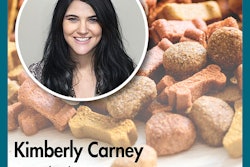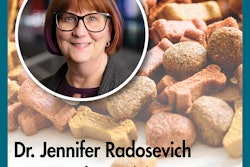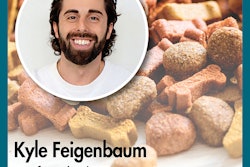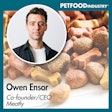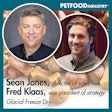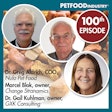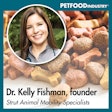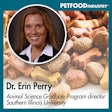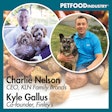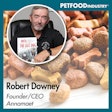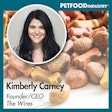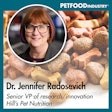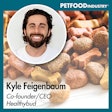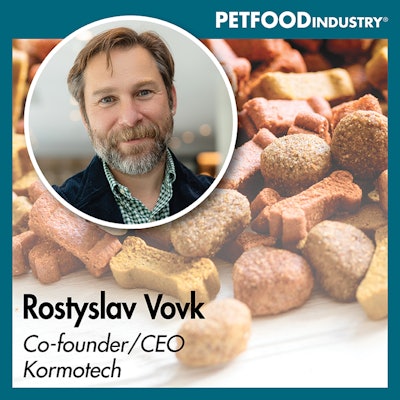
In this episode of Trending: Pet Food, Lindsay Beaton speaks with Rostyslav Vovk, CEO of Ukrainian pet food manufacturer Kormotech, about building a business rooted in social responsibility. Vovk discusses how Kormotech's community-focused initiatives — from educating children about proper pet care to opening veterinary schools and launching a free pet owner hotline — helped the company capture over 35% of Ukraine's pet food market.
We want to thank AFB International for sponsoring this podcast. AFB is the premier supplier of palatants to pet food companies worldwide, offering off-the-shelf and custom solutions and services that make pet food treats and supplements taste great.
Lindsay Beaton, editor, Petfood Industry magazine and host, Trending: Pet Food podcast: Hello and welcome to Trending: Pet Food, the industry podcast where we cover all the latest hot topics and trends in pet food. I'm your host and editor of Petfood Industry magazine, Lindsay Beaton, and I'm here today with Rostyslav Vovk, co-founder, CEO and chairman of the supervisory board of Kormotech. Hi Rostyslav, and welcome.
Rostyslav Vovk, co-founder, CEO, and chairman of the supervisory board of Kormotech: Hello Lindsay. Nice to speak to you.
Beaton: In case you're unfamiliar with Rostyslav or Kormotech, here's what you need to know. Under Rostyslav's leadership, Kormotech has become one of the world's top 50 pet food manufacturers and entered 50 international markets, and has grown its team to 1,500 people across five countries. Rostyslav regularly represents Ukrainian business at international economic and investment forums. In recent years, he has spoken at the Forbes CEE Forum in Romania, the 17th European Economic Congress in Poland, and the Rebuild Ukraine Business Conference in Canada.
Kormotech is an international family-owned company with Ukrainian roots that has been producing high-quality pet food since 2003. The company manufactures products under the brands Optimeal, Delickcious, Club 4 Paws, Hav!, Miau! and My Love. Kormotech operates production facilities in Ukraine and the EU, offering a portfolio of over 650 products.
Rostyslav's unique experience with corporate social responsibility via the Save Pets of Ukraine initiative is why I've brought him on today to answer this question: How can companies navigate their own social responsibility in the pet food space?
Rostyslav, I want to start off by setting the stage for how you view corporate responsibility, because that is going to flavor the entire conversation we have. What is your personal philosophy on the responsibility of pet food companies to their communities and the people and pets that they serve?
Vovk: For me, it's a very easy question—corporate social responsibility is part of our life. All of us who are working in Kormotech or with Kormotech, we are living in our cities and countries. If we want our cities and countries and places to be good to live in, then you need to think about what's happening around you, not only at your house or your flat, and not only at your company. If you want to make your city a better place to live, if you want your kids to be living in your area, you need to think also about your cities. You need to help your community.
If we are speaking about our company, we are responsible for pets. We are making products for pets. That's why we are focusing on this social responsibility for pets. We are doing other things too—we are helping hospitals, we are helping kids, and we definitely help a lot of our people who are fighting now during the war. But the focus, which started in early 2012, is social responsibility which is part of our life with pets.
Beaton: Do you think that working in pet food gives businesses a natural avenue to social responsibility? You're already providing nutrition for pets, helping pets and their humans live a better life through helping their pets stay healthy. Does that just really easily lend itself to expansion—being able to support the shelters in your area, or support pet owners? Is that just kind of a natural progression of the industry that we work in?
Vovk: From my point of view, Lindsay, yes, if you are a company that is not thinking only about earning money, or you are not here just to make a big startup and then sell it in a year or two or three years. If you are here for a long period of time, and if you are a family business, this must be a part of your business. It must be part of your daily routine, because we can come back to the part of our mission—we believe that love for pets is making the world a better place.
But we know that there are a lot of pets who do not have a good life, or who are abandoned, who were someday a present and then they were thrown out on the street because the family was not ready to be with this pet. We have a lot of shelters. If we really believe that we love pets, then this is part of our values. If we really love pets, we need to share our lives with the pets which do not have homes, which are abandoned. For me, it's just the basis.
Beaton: Now I want to transition into something that you are specifically involved in. I've been following Save Pets of Ukraine for quite a while now, and it is a very important initiative and organization. How did Save Pets of Ukraine come to be and how does it serve your larger ethics regarding social responsibility?
Vovk: The story started not from 2022, not from the full-scale invasion. The story started in 2014 when we had what they called the Anti-Terrorist Operation at the time in the eastern part of Ukraine, after the Russian occupation of the eastern part of Ukraine. We decided that we needed to do something, because there were a lot of pets which were abandoned. There were a lot of shelters which did not have the possibility to have food, and not only food, but some expenses to live.
We started in 2014—at that time, we did it only by us, only by Kormotech. Even at that time we sent this information to Petfood Industry. That's how we first managed to know each other with Petfood Industry, because we were telling about this initiative. We did this initiative during six years. We were helping this part of Donetsk and Lugansk, which were occupied. We were sending goods to the people who we truly knew, and we knew that they were not going to sell this product, that it would help.
Then in 2022, just on the fourth day of the full-scale invasion, we understood that now everybody is helping. All the companies, all the businesses which were working chose some part of life to help. A lot of people started to help the army. A lot of people started to help people. A lot of people started to help hospitals and everything else. We decided that we were going to focus on helping pets. That's why we started this initiative. We called it Save Pets of Ukraine.
At that period of time, there were a lot of volunteers inside our company, because we stopped all marketing activities—during war, who is thinking about marketing and television or TV commercials? We already had 40 people from marketing who were eager to help, also some people from logistics. We started this, and then in one or two weeks, we understood that we could not do it just on our own, because it's just impossible—the scale of the problem is super huge.
Then we formalized our effort by founding U-Heart Foundation, because we understood that we needed help from abroad. We needed help from the U.S. We needed help from Europe, and we needed help from other companies. That's why we founded this U-Heart Foundation in Eastern Europe, because it can officially speak to the donors. You cannot speak as a private company to the donors, because nobody will speak with you about this topic.
We opened that foundation, and this foundation has been working more than three years now. To make the story short, we are super proud of what we did, and we are super thankful for our donors, not only our company, but also our donors. The biggest donor is a company from the United States. We have some partners in the U.K. and in Europe and in Ukraine.
We have already raised more than 2,000 metric tons of pet food, which were delivered to shelters and are still being delivered. We also help volunteers. We also help to make vaccines—we did vaccination programs for more than 20,000 pets, if I remember well. We calculated that more than 300,000 pets were rescued with help of this initiative. In total, the initiative in three years gathered more than $7 million U.S. dollars. Now it's even more to help our pets. We are still doing this, and we will be doing it until the end of the war and beyond.
Beaton: What has it been like for you personally, and then just for the people who work at Kormotech, to be part of something like that? I can only imagine how helpless a feeling it can be to have war land on your doorstep and know that you can't end it, you can't fix it, but the path that you have found to be able to do something, to make some change within your sphere of influence. How does that help your company overall? Not even from a business perspective, but just from a human perspective?
Vovk: You answered partly this question, because if you are waking up in the morning and you have a war at your doors, at your place, you have two possibilities. One possibility is you're afraid—you could sit and wait when somebody will invade you, or you could find something to help with. Because if you are always thinking that war started, that's the end of the story, that's the end of my life, then you will be eating yourself from the inside.
From another point of view, you cannot think about big topics. You cannot project something that will happen in a month or in two or even in one year. You need to live day by day, and you need to have small, good stories every day that you would stay safe. You would stay psychologically normal.
When we started to speak with our people, there was no question that we would do nothing. We understood that we would do business, because we are responsible for more than 1,500 families, we need to pay their salaries. That's why we need to work. We need to find the possibilities, not only in Ukraine, but abroad in Europe. We need to speak to our partners. From another point of view, we need to help somebody, because this somebody who we will help today, they will help us tomorrow.
Beaton: Now, I know your circumstances are extraordinary, and it can be difficult to translate something that's immediate and big and personal to business advice, right? What you're doing is much bigger than business. We're talking about humanity, but I would say the vast majority of pet food companies are involved, or want to be involved in some way in their community. But what if a company is not sure what the best route is?
Even setting aside the huge organization that you guys have helped build and that you're dealing with, you have had a philanthropic focus from the start of Kormotech. How did you decide what the best course of philanthropy was in your sphere of influence? How did you decide on shelters, or people? Because there are a lot of different avenues a company can go down when it comes to that. How do they narrow it down to choose what they will be able to best serve in terms of their local community?
Vovk: Two topics which we understood when we started the life of our company. First of all, the penetration in Ukraine was maximum 25% to 27%—it means that people were not believing that pet food is something good for their pets. The penetration was super small.
Another topic was that Ukrainian people were not believing in Ukrainian producers of pet food, because it was always huge multinationals, and on the television it was only huge multinationals. It meant that people were thinking that we are doing something in the garage, and we are using very bad raw materials only, bones with salmonella and everything else.
We did something with this. We understood that we needed to open the doors to our facilities, and we needed to show how we are doing it, how we are living with this production, and how dedicated we are about the quality of the ingredients and quality of the food. That's one part.
Another part: We understood that there are a lot of pets who are thrown away on the street because people are not ready to understand how to live with a pet. Another topic was that the culture of living with pets—a lot of pets were staying on the street with a chain. It was a lot like this in Ukraine. We understood that we needed to change the quality of life of pets. That's how we understood what we needed to do.
We started to work with kids in schools that kids would tell their parents. If I like the movie "The Mask," for example—you remember the Mask movie with the dog? It's a super popular movie from the 80s with Jim Carrey. Everybody was crazy about that kind of dog. But you cannot have this dog if you are living in a flat, because this dog needs to be on the street for six hours. He loves to run. He loves to jump. We started to work with kids in the schools, and we started to tell them how to find the pet which will be okay—he will be good in your family, and you will be good for him. That was the first part.
Then we understood that we had a problem with the veterinarians, and we opened the school Optimal Expert in Ukraine. We call it MBA for veterinarians to teach them to be much more professional. Then afterwards, we decided that we do not have a 911 for pet owners, and we opened a veterinary hotline, 9000 and 100, where people are calling and we are not selling our product there. We are not selling our brand Optimeal there, we are just helping people to find the veterinarians to tell them which is the first aid. It's a free service that helps thousands of pet owners every day with expert advice.
All of this is under the umbrella that we would change the culture of how people are living with their pets. We want to change culture in Ukraine and in Eastern Europe, because it's a very nice culture, you know, in United States, very nice culture in Germany or in U.K., but unfortunately, in Ukraine and in the central eastern part of Europe, we still have some problems. There are a lot of abandoned pets. There are a lot of people who want their pets to live just on the street, not inside their house, not inside their place of sleep. That's how we are choosing this.
Beaton: That's incredible. You're doing a lot. You didn't just pick one thing. You kind of picked all the things. How do you manage the resources for something that multifaceted? Did you have to reach out to other partners? Did you have to bring external people on board? What were these conversations like when you're trying to launch all these different things?
Vovk: Lindsay, if we are speaking about resources and people only, Save Pets of Ukraine initiative—it's done by people who are directly working with this initiative, and we are raising money there. Everything else, for example, this MBA for veterinarians, we are doing with the Association of Veterinarians in Ukraine. All other topics, we did by ourselves.
We understood that we needed to have some percentage of our income which we will invest into our social responsibility. Because from another point of view, yes, we are not a charity organization. We are doing business. We are making business. All these stories which I tell you, they are not only helping people, they are also helping our business. Because if we speak about penetration now, penetration in Ukraine is more than 70%—it means that the market is growing.
If we are speaking about this Optimeal 911, in one day it could be, for example, telemedicine, which we will change into the business. Sometimes, and normally always, it will help the business. But if you will do it only because of business, then it will never help your business. You need to understand that you need to believe in this. You need to spend and invest money in this, and then in a few years, it will help you. It's not fast forward. It's not a fast game.
Beaton: I think that's important to say as well, because I think it can be easy as a business owner to look at everything you do through a business lens and say, "What's the ROI?" But the ROI is not always going to be tangible right off the bat, and sometimes it is the long game.
One of the biggest corporate benefits of being actively involved like this is something that you've talked about quite a bit just throughout our conversation—loyalty, employee loyalty and customer loyalty. You know, if you help somebody's pet, it's just natural that they're going to start looking at your product and be like, "Well, these guys helped me when I needed them. Why would I not buy their food?"
Loyalty, optics, all of that stuff. Have those all been benefits that you have seen, both internally and externally? You said the market penetration is way bigger than when you started, which is obviously a very clear, tangible benefit. But what are some of the other things that you've noticed as benefits of doing all of this?
Vovk: I completely agree with you, Lindsay. We have our market share already. This is the best answer. We have more than 35% of Ukrainian market. We're number one. We beat multinationals. We beat the small players. This is the answer. That's the first topic.
Another topic is that, for example, in our brand Optimeal, on every pack, you can see my photo with my dog. You can see who is doing this product, and you can see the story behind the product, and it helps loyalty. Also, we can see that people who are, for example, adopting a pet from the shelter, they are always asking, "But who is helping this shelter? Which brand is the most responsible?" Normally people are getting the answer, "You can try Club 4 Paws. This is the brand which is the biggest in Ukraine and the most expensive brand in Ukraine," because we calculated this. People are getting this answer, and they are doing this also.
If we speak about our workers, for example, it's not only that you need to spend your money to help the shelters. You can go to the shelter and just walk with the dog who is in the shelter. You can help this way. This is normally done by our workers, and not only by our workers. We can see that there are shelters where you have lines of people who are waiting to walk with the dog. It's definitely helpful.
Beaton: As we wrap up our conversation today, I want to provide next steps for a company that is trying to figure out how to give back to its community. Maybe somebody wants to start a new program, or maybe they want to evaluate their current programs and see if they're doing everything they can.
What are some of the top questions you think a company should ask itself when it's trying to figure out how to best give back to its community? What are the things that it really needs to take into consideration it can make the most impact?
Vovk: First of all, you need to do something which you know how to do. Focus on your professional skills. That's question number one.
Number two, you need to ask people in your community what is bad or what they would change, and how does this problem affect your business, and can you solve it? If you solve it, people will be super loyal to you.
The third: 21st century, it's not the time for making only business. It must be a rule—not only super calculable business. There are a lot of things which you need to do, which you cannot calculate. As you told me, Lindsay, where you cannot calculate ROI—21st century, it's not only about ROI, it's about your life and making life a better place. It must be a rule. A company without this social responsibility cannot be built for 100 years.
Beaton: Rostyslav, obviously you and Kormotech have figured that out incredibly well, because you're doing such important things for your community, and then Save Pets of Ukraine is such an important organization. I encourage all of my listeners to immediately go look them up. If you have not heard of them, donate if you can, see how you can help out.
Rostyslav, I'm really glad you were able to come on and give some air time to the organization, as well as discuss a topic that's really important to the industry as a whole, because everybody in this industry loves pets and wants to be able to help beyond the nutrition. As we said earlier in the conversation, I think this industry is just naturally inclined to be a giving back kind of industry, but it can also be difficult to figure out how you can best give back. This is an important conversation to have. Thank you very much for being on and talking about everything you guys are doing.
Vovk: Thank you very much, Lindsay, and I will be super thankful to you if we get more partners, more donors. We are open to this, and thanks a lot also for the conversation. It's always good to speak to people from our community, from our business.
Beaton: Before we go, I want to do a little plug people know exactly where they can go to look things up. Where can people find more information about you and Kormotech, as well as Save Pets of Ukraine?
Vovk: It's our page, kormotech.com. Another page is U-Hearts Foundation. You can search for Save Pets of Ukraine. There on the page you can find everything.
Beaton: Perfect. That's it for this episode of Trending: Pet Food. You can find us on petfoodindustry.com, SoundCloud or your favorite podcast platform. You can also follow us on Instagram @trendingpetfoodpodcast. If you want to chat or have any feedback I'd love to hear from you, feel free to drop me an email [email protected].
Of course, thanks again to our sponsor, AFB International, the premier supplier of palatants to pet food companies worldwide, offering off-the-shelf and custom solutions and services that make pet food, treats and supplements taste great.
Once again, I'm Lindsay Beaton, your host and editor of Petfood Industry magazine, and we'll talk to you next time. Thanks for tuning in!

